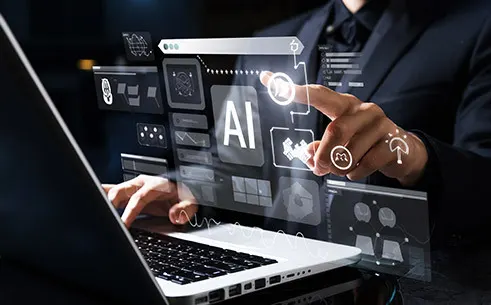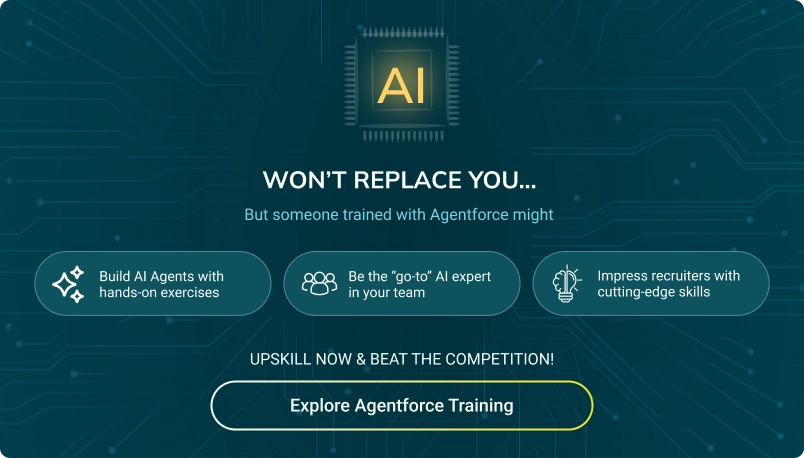Table of Contents
Salesforce is the world’s best customer relationship management platform and they’re constantly evolving, always looking forward to upgrading what modern businesses need. As the calendar flips into 2025, the future of Salesforce is as bright as the innovative and new opportunities that will remake how businesses reach their customers. Let’s dive into what’s new, where Salesforce is headed, and what exciting prospects it offers.
What’s New in Salesforce?
The groundbreaking technologies and tools that will define the future of Salesforce in 2025 have never been experienced by CRM yet. Here are a few notable ones:

1. Agentforce: New Wave of Customer Support
With Agentforce, Salesforce combined human efforts with AI agents to make customer support seem effortless. AI agents help human teams by answering most routine questions so that the latter can focus on complex problem-solving.
2. AI-Driven Marketing and Sales
The future of Salesforce Marketing will be easy by getting help from AI. The tools in this platform help analyze customer behavior, predict trends, and give businesses the right insights to craft hyper-personalized campaigns. Salesforce has become the first port of call for companies looking for innovative, data-driven marketing solutions.
3. Einstein GPT: The AI Revolution
The Einstein GPT is one of the world’s most sophisticated AI tools in Salesforce, enabling Generative AI to be natively integrated directly into the Salesforce ecosystem. The capabilities include generating personalized content, automating tedious and repetitive work, and accessing insights quicker than ever.
4. Ethical AI
Salesforce is doubling down on ethical AI practices, ensuring that its tools deliver value and align with global goals for a better future.
5. Industry-Specific Cloud Solutions
Salesforce has further pressed industry-specific solutions such as Financial Services Cloud and Health Cloud, making it easier for a niche industry to adopt CRM in ways tailored to specific needs.
6. Sustainability Cloud Enhancements
Considering environmental seriousness, Salesforce has enhanced its Sustainability Cloud, enabling organizations to track, manage, and reduce their carbon footprint.
7. Hyper-Personalization through AI Tools
AI tools are transforming the way businesses interact with their customers. The future scope of Salesforce focuses on providing hyper-personalized experiences using advanced machine learning algorithms and predictive analytics.

Salesforce Future and Growth Prospects
Salesforce’s growth trajectory in 2025 is driven by its ability to embrace emerging technologies, expand its ecosystem, and adapt to changing market demands. Here’s a closer look at its growth prospects with data and insights from trusted sources:
1. Market Growth and Leadership
CRM Market Share: Salesforce still leads the CRM market, and by 2025, its market share will reach 25%. It is still the market leader with the full bouquet of tools in Sales Cloud, Service Cloud, and Marketing Cloud for different industries.
Source: Cyntexa
Revenue Milestone: Salesforce’s yearly revenue is expected to hit the $38 billion mark in the year 2025. Compare this to their fiscal 2024 at $34.9 billion. And it’s being propelled due to the advancements in AI-driven solutions and vertical solutions in the company.
Source: Cyntexa
2. The Growing Salesforce Ecosystem
Economic Impact: Salesforce estimated that the ecosystem would generate 9.3 million jobs and $1.6 trillion in new business revenues across the globe by 2026.
Source: Cloudally
Skills Demand: Over 70% of hiring managers prioritize candidates with validated skills, indicating a significant opportunity for those with certifications and expertise.
Source: Moldstud
3. AI and Automation Driving Growth
Adoption of AI Tools: With Einstein GPT and Agentforce, Salesforce is at the forefront of the integration of generative AI into CRM. According to a recent report, 78% of Salesforce customers use AI tools for improving decision-making capabilities and productivity.
Source: Salesforce State of AI Report, 2025
AI Market Integration: The global AI market is predicted to reach $190 billion by 2025, and if Salesforce continues its investment in AI tools, then it will gain a significant chunk of the AI market.
Source: Gartner AI Market Report, 2025
4. Expansion in Industry-Specific Solutions
Salesforce’s industry-specific clouds, such as Financial Services Cloud, Health Cloud, and Manufacturing Cloud, have seen rapid adoption. These tailored solutions help businesses meet unique regulatory and operational challenges, driving Salesforce’s future growth.
Statistical Insight: Over 60% of Salesforce’s new customer acquisitions in 2025 are attributed to these specialized clouds.
Source: Forbes Analysis on Salesforce Growth, 2025
5. Global Ecosystem and Partnerships
Expansion of AppExchange: Salesforce AppExchange has 9,000+ solutions, making it the largest enterprise app marketplace. Innovation is fostered by this, and Salesforce grows into new markets.
Partnership and Acquisitions: Salesforce is strengthening its position through strategic partnerships with companies like AWS and Slack, as well as acquisitions like Tableau and Mulesoft.

Know About the Future of Salesforce Careers
The Salesforce employment front has been changing fast due to artificial intelligence, automation, and digital transformation. In this context, Salesforce professionals should prepare to adopt new technologies as organizations hunt for better ways to engage customers, automate processes, and create efficient pathways.
In the near future, Salesforce roles will not entail the management of CRM systems and writing of Apex code; rather, AI-driven automation, predictive analytics, and intelligent customer interaction will require talents. With Agentforce and Einstein AI, professionals across different Salesforce careers will see a shift away from their traditional day-to-day responsibilities toward a focus on more strategic and impactful work.
How AI and Automation Are Transforming Key Roles?
1. Salesforce Admins: From System Administrators to AI-Powered Workflow Specialists
Historically, Salesforce admins have been concerned with controlling user access, dashboard customization, and system functionality. AI-powered automation will drastically alter their role, though. Next-generation admins will have to use AI-driven insights to automate mundane processes, streamlining data management and minimizing the need for human intervention.
With Agentforce AI, admins can configure smart chatbots that address frequent user requests, offloading workload while enhancing system support. Automation tools such as Einstein Flow will enable admins to build self-improving workflows that adapt to user behavior.
Instead of merely troubleshooting problems, admins will be workflow architects, crafting smarter and more predictive Salesforce environments.
2. Salesforce Developers: Coding Less, Configuring More with AI-Powered Development
Salesforce developers have traditionally been tasked with coding custom Apex, integrating third-party systems, and creating Lightning components. But with the emergence of low-code and no-code platforms, developers’ work will be revolutionized. AI-powered development tools will automatically generate code snippets, anticipate possible errors, and provide optimized solutions, drastically accelerating development cycles.
Where hours are wasted in debugging, the developers will perform as AI-enabled solution architects where AI-created code is aligned with business objectives. Agentforce-driven development aides will assist the developers in generating efficient, scalable code by checking existing frameworks and proposing enhancements.
With automation stepping in to dominate repetitive coding jobs, the developers will concentrate on creating smart, adaptive applications as opposed to penning lines of code.
3. Salesforce Consultants: The Emergence of AI-Directed Strategy and Business Transformation
Salesforce consultants have long assisted companies in deploying Salesforce and streamlining workflows to enhance productivity. However, with AI-powered analytics and predictive modeling, consultants will move from process optimization to AI-driven business strategy.
Instead of merely implementing Salesforce for customers, consultants will teach AI algorithms to learn business trends and recommend customer engagement, sales forecasting, and one-to-one marketing.
With Einstein AI, they will be able to forecast customer behaviors, enabling businesses to make informed decisions quicker than ever before. In the future, Salesforce consultants will serve as AI interpreters, helping businesses derive maximum benefit from their data-driven insights.
4. Salesforce Architects: Designing Scalable AI-Integrated Ecosystems
Salesforce architects have long had a broad-view role, architecting systems that bring Salesforce together with other enterprise applications. In the future, their attention will be on constructing AI-powered Salesforce ecosystems that self-optimize and need little manual effort.
With Agentforce AI, architects will have the capability to design smart data models that adapt automatically to user actions and business requirements. They will have to facilitate smooth integration between AI-based decision-making tools, automation engines, and customer interaction platforms.
Rather than designing only scalable Salesforce environments, architects will develop smart, self-optimizing systems that evolve continuously with AI-based insights.
5. AI and Automation Specialists: The Key Drivers of the Future Salesforce Workforce
As AI further transforms business operations, a new breed of Salesforce professionals will come into being—AI and Automation Specialists. They will set up, train, and maintain AI-powered Salesforce tools to ensure that businesses use AI for customer interactions, workflow automation, and predictive analytics.
With Einstein AI, companies will depend on AI experts to automate complex processes, minimizing human intervention in repetitive tasks. Agentforce’s AI-based virtual agents will manage customer interactions with human-like intelligence, so it will be crucial for experts to optimize AI responses and guarantee correct decision-making.
These experts will not only keep AI-powered tools updated but also optimize and enhance their efficiency continuously, making Salesforce the leading edge of business automation.

How Salesforce Certifications Can Boost Your Career?
Certifications are a must if you want to succeed in the Salesforce ecosystem. They prove your expertise and open the door to higher-paying jobs. Here are the most popular certifications:
- Salesforce Administrator: Ideal for beginners managing basic tasks.
- Salesforce Developer: Perfect for those interested in coding and building custom solutions.
- Salesforce Architect: Advanced certification for designing complex systems.
- Marketing Cloud Certification: For professionals working on Salesforce marketing solutions.

Summing Up
The future of Salesforce is full of promises. It has AI-driven innovations like Einstein GPT and Agentforce; it has an incredibly robust ecosystem of certifications and job roles that shape the future of business, and its sustainability, industry-specific solutions, and advanced technology keep it right at the head of the pack in the CRM market.
Whether you are a professional looking to grow or a business seeking to transform operations, Salesforce is the platform to watch in 2025 and beyond. The journey into the future of Salesforce is just beginning—are you ready to be part of it?
Staying updated with the latest Salesforce opportunities, certifications, and tools would unlock the full potential of this dynamic ecosystem. There are endless opportunities for innovation, growth, and success in the future scope of Salesforce.
Join our newsletter: Get daily update on Salesforce career insights & news!
Join Now!

















